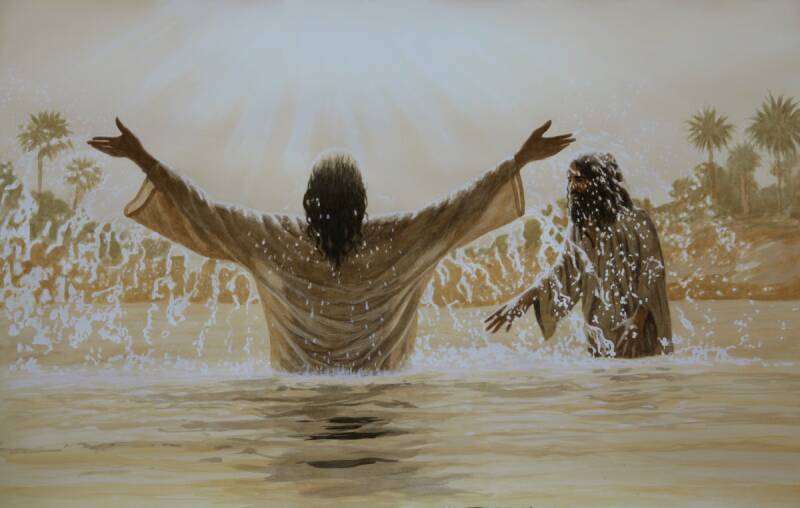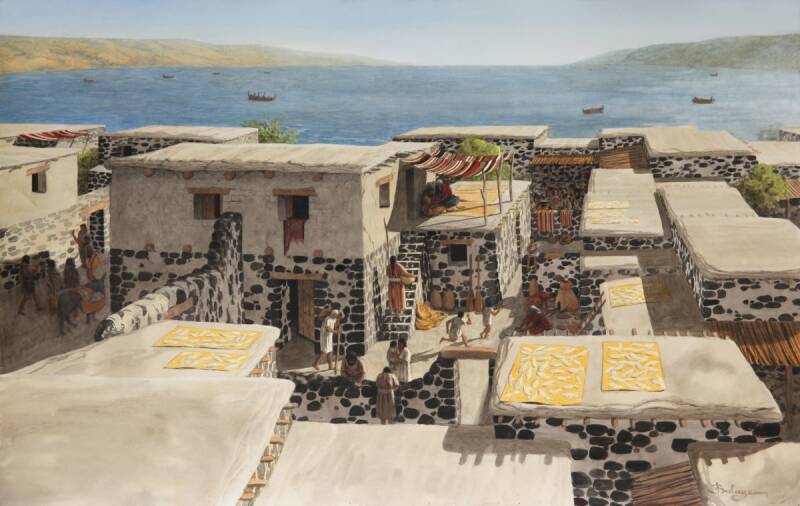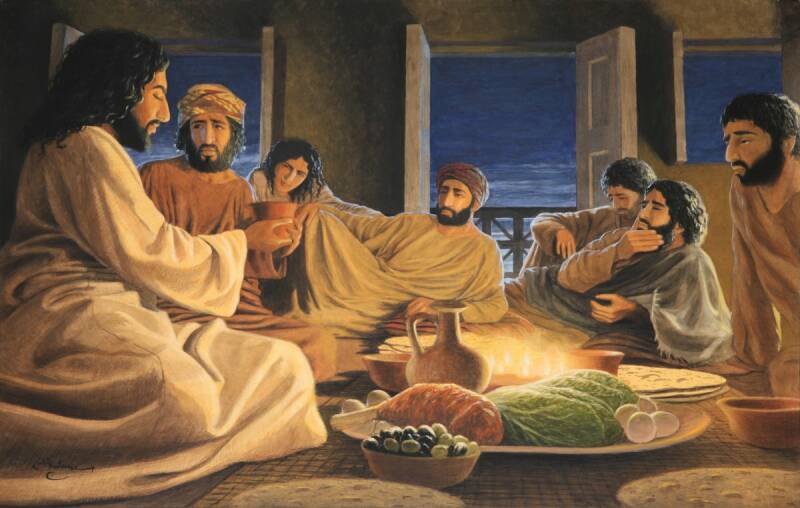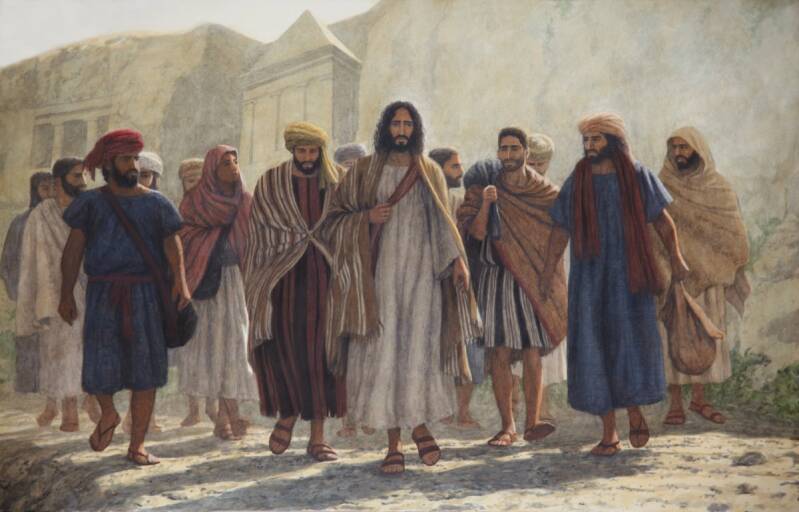Capernaum and Jerusalem, late 30s
Introducing: Aramaic words and oral traditions
Before they were called Christians, they were called the people of the Way, because they followed the Way of Jesus, his Halakha. Following a rabbi was to serve God in accordance with his interpretation of the Thora, the Jewish Law.
Remembering Jesus in Aramaic
Jesus' friends spoke Aramaic, a language similar to the Hebrew of the psalms and the prophets. It was the vernacular of the East, from Jerusalem to Babylon. Of course, they spoke Greek with Greek colonists and Roman administrators. But they thought, dreamed, and lived in Aramaic. Only later, when their message spread to the West, did they write letters and stories in Greek, and Yeshua or Yeshu became Iesous (Jesus), and Yochanan became Ioannes (John). But sometimes you can find words in Aramaic that had become so familiar that they were used in their Greek letters and gospels.
Belief in Jesus did not begin with the writing of the New Testament. Before stories were put down on paper, his friends shared their memories of Jesus. Paul talks about this: the words of the Lord were passed on to him when he joined the followers of Jesus.
Like stories on the funeral of someone you didn't know t well
The stories are given without connection, explanation or progression. The selection of only those stories with a distinctive Aramaic word, or those generally accepted as older traditions quoted in the letters, is something of a random selection of Jesus traditions and lends itself for a first chaotic acquaintance - as if you listen to the stories of people attending a funeral when you did not really know the persion that well.
The chapter is meant to be a bit disorienting and an invitation to NOT know that much before we start reading the letters and gospels. An invitation to really follow the flow of the letters and gospels, rather than using what we think we know from later works to silence our questions. This will be especially important when we realize that Acts was written decennia after the fact with a specific purpose (which also means that we can understand Acts far better understandable when we get to the point in time that it was written).

The baptism of Jesus in the Jordan River. © Balage Balogh, Archaeology Illustrated.
Maranatha
1 Cor 16:22, 1 Thess 4:15, Luke 3:1
"It began sometime in the 15th year of Emperor Tiberius," Maryam recalls. "Just ten years ago: Yochanan the baptizer called out from the desert."
"Yochanan baptized me," Andrea adds, "on my knees in the Jordan. Water poured over me. My eyes closed, I held my breath. And when I came up, I took a deep breath. O, that first breath! The Baptist said, "Things must change! Do not follow emperors and princes. God is the rightful king. "Maranatha!" he cried: The Lord is coming! Come, our Lord!"
"Do you remember what Yeshu said?" asks Kepha, "When the last trumpet sounds, and the Lord descends from heaven, the dead will be raised and the angels will gather God's children from the corners of the earth."
"I didn't know what to make of that," says Maryam. "Did he mean that the Lord would once again lead the army of Israel, as he did in the desert? Or did he mean that we would live with him in heaven?"
"I can still hear his voice," says Yochanan, "It makes me feel that He is still with us. Maranatha! The Lord has come."
Rabbi
Mark 9:5, Acts 9:2, 1 Cor 11:12, John 20:16
"Why do they call us the people of the Way?" you ask.
"He was my rabbi, my master, my teacher," says Andrea. "He taught us his way, his halakha. And we learned by walking with him."
"Come and see," Philippos says, "see and do."
"I got a letter," you say, "from a man named Paul, 'Follow me,' he wrote, 'because I follow Yeshu.'
Maryam looks into the flames of the fire: "I called him my great master, rabbuni. It was the last time I could hold him—but I had to let him go."
Andrea (Andrew) in the 4th-century catacomb of Thecla, Rome

Abba
Gal 4:6, Rom 8:15, Mark 1:35, 14:36, Luke 11:2
"When he taught us the Lord's Prayer, it felt strange," says Yochanan. "We were more used to words like ha-melech ha-olam, the king of the world. But for Yeshu, God was above all a loving father."
"He did that more and more, after our father Joseph had died," says Judah. "Abba, father, he prayed."
"Once we lost him after a hectic day," says Kepha, Andrea's brother. "We found him outside in a quiet place in the early morning.
'Where were you?' I asked him. 'With my Abba.'"
Shoshanna takes over: "It felt like the first word that we had to learn: Abba - as if we had been born again. When we learned to know the father of all, we learned that we were all brothers and sisters."
Raka!
Matthew 5:22
"It was one of the sayings he made us memorize," says Andrea: "According to the law, a murderer must be brought before the judge. But I tell you this: if you get angry with your brother, you are already guilty. If you call him Raka!, fool!, you will have to appear before the High Council and burn in hell. You must be perfect, as your heavenly Father is perfect.”
Yochanan: "I thought it was a strange idea, a goal no one can attain. But maybe that was his purpose, that we would discover that there is no standard that separates the pious from the sinners."
"He was my older brother," says Ya'kov, "you don't want to know what he called me when I was teasing our mother."
Talitha kum!
Mark 5:41
"At first, they allowed him to speak in the synagogue," Kepha says. "But then he healed someone there on the sabbath. He was criticized for that. Yair, one of our synagogue leaders warned him: 'Yochanan the Baptist was put in prison for a reason,' he said fter that, we gathered at my mother-in-law's house. One day, Yair's little daughter was sick. 'Please come, rabbi,' he begged Yeshu, 'my daughter is dying. Come and lay your hands on her!' The house was full of weeping people. 'Let it go, she's dead,' they said. 'She is sleeping,' Yeshu answered and then they laughed, but he drove them out of the house."
"I was there too," says Yochanan—not the Baptist, but Yeshu's cousin and disciple. "We stood by her bed with her father and mother. 'Talitha, kum!' Yeshu said, Girl, get up! She opened her eyes and stood up. Yeshu did nit even seem to be surprised. 'Give her something to eat,' he said."

The possible home of Simon Peter's in-laws in Capernaum, a fishing village of about 1,500 inhabitants on the Sea of Galilee. © Balage Balogh, Archaeology Illustrated.
Effatha!
Mark 7:34
Philippos' turn: "We passed through the Golan and saw a man who was deaf and mute. 'Lay your hands on him,' the people there said. The man was a pagan. But he was also a man who could not hear and could barely speak. They laughed at him and abused him to shame Yeshu into action. But what can you do when people don't trust you? Yeshu did nothing. Finally, the people dispersed. Then he took the man by the hand and we walked out of the village. There, he took the man apart and looked him in the eye. And the man looked him in the eye. Yeshu opened his mouth, and the man opened his mouth. You could see that he started to hope. Suddenly, Yeshu put his fingers into the deaf man's ears and spat on the man's tongue. 'Effatha!' he said, be opened!"
Mammon
Matthew 6:24, Luke 16:8
Andrea tells you his story: "There was an economist who worked for a rich man. When he was about to lose his job, he called in the tenants. He had forged their debt letters and halved the amounts they still had to pay. When he was fired, they gave him a place to stay. People spoke of it. 'I think it's clever,' Yeshu said. 'He used evil money to live well in his afterlife. Isn't that what God would want you to do too?'
'You cannot serve two masters,' Yeshu added. 'Which will it be for you: mammon or God? You should this evil money to make friends for all eternity. If you don't understand that when it comes to something as trivial as money, how will you deal with the greatest treasure God has given you?'"
Kepha
Gal 1:18, 1 Cor 1:12, John 1:42, Matthew 16:18
"Why did he call you Kepha," you ask Shimon.
"That was in the mountains of Lebanon, after the execution of Yochanan. He seemed to be struggling with everything that had happened. He asked us what his task was: baptizing, healing, or to get arrested and executed? 'You are God's anointed one, son of the Living God,' I said then." He falls silent.
"And then he called you Kepha? Isn't it almost the same name as the high priest at the time?"
Shimon nods, “'Shalom, Shimon son of Yonah,' Yeshus said to me, 'you are my Kepha, my rock.' And then he announce we had to go back to Jerusalem, even though the high priest there was seeking his death. 'It will be your death,' I said. 'If it is my time,' he answered, ' I will die like all of us will one day.' 'You can't say that,' I exclaimed, 'God will never let that happen!' And then he called me Satan.
B'nei ragas
Mark 3:17, Luke 9:54
"The time had indeed come," says Ya'kov, Yochanan's brother and son of Zabdai. "We set off for Jerusalem. On the way, he looked for a place to sleep in a Samaritan village, but we were not allowed in. 'No pilgrims for Jerusalem,' they said. No troublemakers, they thought. Yochanan was indignant: 'Do you know who you are rejecting?' he cried. 'God will fill this hellhole with thunder and lightning!' I laughed at my young brother, but Yeshu responded sharply. B'nei ragas, he called us, sons of thunder, driven by anger. 'We'll ask again in the next village,' he said."
Don't divorce
1 Cor 7:10, Matthew 19:1-11
"Mind you, he could also be stricter than the rabbis," Maryam explains. "Herod Antipas had married the widow of his brother Philippos and he had sent his Arab princess away after thirty or forty years of marriage. His well-paid scribes approved, but her father was furious and gathered his soldiers for battle. Yochanan the baptizer had protested against Antipas and it cost him his head. 'Are you also against divorce?' they asked Yeshu. 'He sent his wife away to marry another,' Yeshu answered, 'how is that not adultery?' 'But why does the Law of Moshe allow a husband to give his wife a bill of divorce so that she can remarry? Then it's settled, isn't it?' 'Because of your hard hearts,' Yeshu answered. 'Haven't you read how God intended it to be in the beginning: that man and woman are one?' 'If you can't get divorced, you'd better not get married,' we said. We looked at him, not understanding. 'You don't understand but it almost happened to my mother,' he answered.
The new covenant
1 Cor 11:12
Maryam breaks the bread and invites you: "Would you like to say the words today?"
You say you weren't there. "How could I possibly tell you what I have not heard him say myself?"
"Go ahead," she says, "you have heard these words often enough now."
She takes the plate of bread and passes it around.
And then you open your mouth: "It was on the night he was betrayed. He took the bread and gave thanks to God. Then he broke it into pieces and said, 'Take it, eat it. This is my body, broken for you.' After the meal, he took the red wine and poured it into a cup. 'This is my blood, shed for you, as the blood of the Passover lamb was shed in Egypt. Take the cup. Drink from it and remember me whenever you share this meal together. That is the new covenant between God and humankind until I may embrace you again.'"
"Amen," she says, "as we are with him in his death, so he will be with us when he comes again."

The Last Supper. © Balage Balogh, Archaeology Illustrated.
Eli, Eli, lema sabachthani?
Mark 15:34, Matthew 27:46, John 19:27
"I was only sixteen when he died," says Yochanan. "I stood there with my mother and his mother, her sister. As he hung there crucified, he asked us to take care of her. Maryam was there too, but our friends had fled. It was bleak and gray. I will never forget his words: 'Eloi, Eloi, my God, my God, why have you forsaken me?' I thought he was giving up. Later I understood that he was quoting the words of the psalm."
Maryam nods: "He said it in the Hebrew of the Holy Scriptures: "Eli, Eli." That's why the people further away thought he was calling for the prophet Eliyahu. Someone brought him a sponge to drink from."
Yochanan is silent. You watch him stare into the void. Does he hear it all again?
Shaul
1 Cor 15:1-8, Gal 1:18, 3:13
"I hated him," says Shaul. "I hated that my friends in our synagogue thought he was a prophet, anointed by God. When I heard that he had been crucified, I knew for sure. Moses wrote, 'Cursed is every body that is crucified.'"
Shimon nods. Actually, he didn't know, but it's clear to him that this is important to his visitor.
"The temple police were looking for his accomplices." Shaul continues, "in our synagogue, they said that a group around Stephanos was going to set fire to the temple. Friends of mine, you understand. I had to turn them in. They were interrogated, flogged, stoned. I stood there when Stephanos died. Some fled to Damascus, and I volunteered to be an eyewitness for the arrest team. But on the way, in the desert near Damascus, I saw a blinding light. And I heard a voice, as clear as I hear you here: 'Shaul, Shaul, why are you persecuting me?' From that moment on, I was blind and sick and useless as an eyewitness. The team went back but left me behind in the city inn, delirious on a bed. Deep down, I knew that I had heard the voice of Yeshu. But in my clouded mind, I wanted it to be a heat stroke, or even Satan pretending to be an angel of light. But not Yeshu! Because if that really was Yeshu, that would make the greatest sinner there is. I who tried to keep all the commandments, I who had come to Jerusalem to study the laws of my people, I who wanted to be more Jewish than the Jews! I would have stood against God's Anointed. I would be a traitor to my friends, a murderer. Unjustifiable. Lost forever."
Shimon nods again, he does not have to say anything.
Shaul continues: "That is how one of my former friends found me, one of you. He came to me, he prayed for me, he healed me. We talked late into the night. He taught me this tradition: The Anointed One died to redeem us from the slavery of our sins, as it is written in the prophets. He was buried and rose again on the third day, as it is written in the prophets. He was seen by Kepha, that is by you, by the Twelve, by more than five hundred brothers together, by his brother Ya'kov, and then by all the apostles."
Shimon nods a third time and says: "Maryam saw him first, but no one believed her. And his brother Ya'kov did not believe that he was a prophet, but he too saw him. And since tat day he has joined us."
Now it is time for Shaul to nod, and he adds emphatically: "and he appeared to me last of all, as to a foetus struggling not to be born."
Your turn
These little stories are the product of my imagination. But you also have the references to the Bible verses that I started with. Go ahead. Pick one and try to turn it into a moment of sharing memories.
Summary: The Way of Yeshua, 30s.
In the letters and books of the New Testament, written in the international Greek of that time, we hear older traditions and Aramaic words: the memories of Jesus' Jewish friends and relatives in Galilee and Jerusalem. They share John the Baptist's desire that the Lord would intervene in their difficult times: Maranatha, Come, Lord! They hope that Jesus is the anointed leader, the Messiah. But he also gives them something for today, as he shows them how to trust God as their loving father, their Abba. They remember how he also called his friend Simeon Kefas, rock – or Peter in Greek. They are there when, in his last week, he celebrates the Jewish Passover and says that he himself is the sacrificial lamb of the new covenant, the New Testament, with which God will write his commandment of love in the hearts of his children. And they tell each other how, even after his crucifixion, they saw him alive and heard him, Peter, the disciples together, and his brother James. And they conclude that he is the anointed one who is to come: Maranatha!

Jesus and his disciples in the Kidron Valley near Jerusalem. © Balage Balogh, Archaeology Illustrated.
A bit of background information: The struggle for the Kingdom of Israel
After the death of King Herod, the kingdom of Israel was divided among three of his sons, under the supervision of the Roman governor of Syria (see map here). But the eldest of the three was incompetent and sent in exile, and Judea was given a Roman commander. The Herodians then placed their hopes in his younger brother Antipas, who ruled Galilee. Would he be able to reunite the kingdom as God's anointed one, by the grace of God?
According to Luke 3:1, it was in the year 28 or 29 that John the Baptist arose in the desert: "God himself is our king, repent and welcome his coming." Was that meant to be symbolic or a call to civil disobedience? John was arrested and later beheaded after criticizing Herod Antipas for divorcing his wife, an Arab princess, and marrying his niece Herodias who had been his brother's wife. Antipas and Herodias wanted to become king and queen of all Israel. After the death of his brother Philip, he asked Emperor Tiberius to inherit his brother's territories: the cities and trade routes across the Jordan, between Arabia and Damascus.
But his former father-in-law, the Arab king Aretas, did not accept this. He mobilized his army and brought it to the border. Antipas gathered as many soldiers as he could to prevent him from passing, but he did not have enough. Did not Jesus say, "What king goes out with 10,000 men against 20,000? Would it not be better to ask for the terms of peace?" To make matters worse, his cavalry refused to fight for the man who had killed John the Baptist. In the summer of the year 36, Antipas' army was defeated. "God has punished him," the people said. When Saul went to Damascus with the temple police, Aretas' army was guarding the gates.
Jesus was arrested on the orders of Caiaphas, the high priest who ruled Jerusalem and Judea under the watchful eye of the Roman commander Pilate. "King of the Jews," was the charge. "Is that what you claim?" Pilate asked him. "My kingdom is not of this world," Jesus is said to have replied. He was crucified as the leader of a rebellion against Rome. According to many, this happened during the Passover of the year 30. Or 33, say those who want to give the stories a little more time. But 36 is also possible, and perhaps even more likely, I think (see here for the background to these dates).
Pilate found himself in a difficult position: he was trying to provide the city of Jerusalem with a better water supply, but when he used money from the temple treasury for this purpose, the people rebelled—a rebellion he crushed with force. "Sacrilege," the people cried. A tower near the water basin collapsed and eighteen people were killed. "Because of their sins," they said. Jesus said to someone who wanted to follow him: "Think carefully first whether you can bear the cost. Otherwise, you will be like the man who was so mocked by the people because he started building but did not have enough money to finish the tower." When a prophet of the Samaritans led his followers up a mountain, Pilate had them killed. The Samaritans then complained to the Roman governor of Syria. The Roman governor intervened. In the fall of the year 36, he sent Caiaphas home and Pilate back to Rome.
Add comment
Comments
Good job my brother